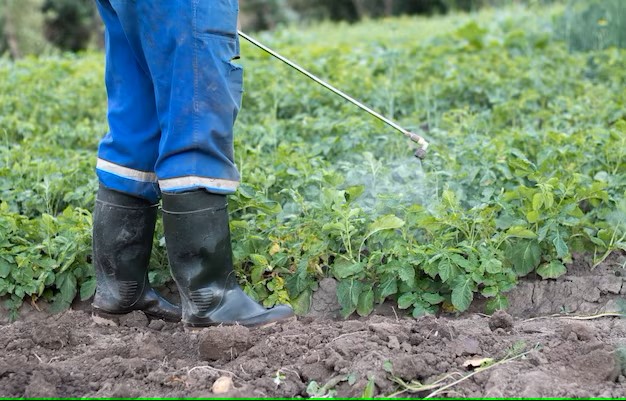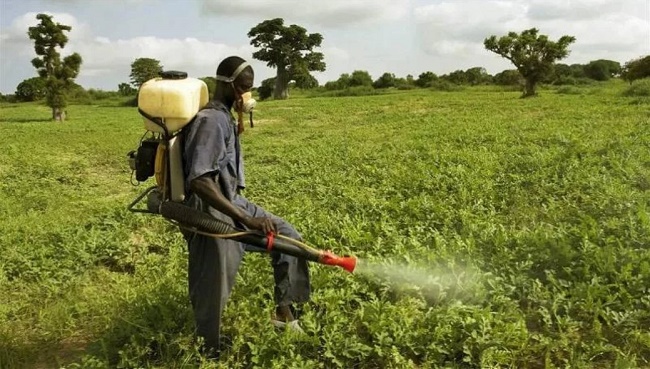
Last July, at the National Stakeholders Consultative Meeting on the 2024 Agriculture Budget held in Lagos, the ActionAid Nigeria (AAN) regretted that the country’s agricultural sector is largely proliferated by hazardous agrochemicals. This has been further compounded by farmers’ wrong application of these chemicals.
The group alleged that government budget spending through the Federal Ministry of Agriculture and the Central Bank of Nigeria (CBN) Anchor Borrowers Programme (ABP), favour inorganic pesticides over organic bio-agro inputs.
AAN stressed that the pesticides are often highly hazardous to humans, particularly, when wrongly applied; the environment, and biodiversity, causing loss in foreign revenue, resulting in food export rejection.
An agricultural extensionist at the National Agricultural Extension and Research Liaison Services (NAERLS), Prof. Fadlullah Olayiwola Issa, has also lamented the hazard of agrochemicals –pesticides, herbicides and others, and the widespread destruction it has wreaked on many Nigerians through daily consumption of farm produce.
His words: “All categories of Nigerians are at risk of the consequences of agrochemicals owing to the fact that we all consume produce from the farms. You know chemical would not kill you at once. If you eat vegetables, you are eating chemical, even green vegetables. The reason is this, there are rules to chemical use, if you spray some chemical today, the rule says for the next seven days you must not harvest it, and it must not be consumed.
“But many farmers are pressed. If you get there, they would not tell you they sprayed the vegetables yesterday, so, you have consumed part of the chemical, it will not kill you one day.
“When you see different health cases in the hospitals today, you may not know the causes. The man might say he doesn’t consume anything synthetic, he only eats farm produce that are raw, yet still dying of cancer or kidney-related ailment. All of us consume it because farmers don’t follow the guidelines for spraying of chemicals.”
Though there are actually different phases to this issue, the major challenge is misuse, abuse and wrong application of chemicals, coupled with usage of agrochemicals already banned in other countries, which has become a major concern stakeholders, regulatory agencies and the government have failed to address.
The country is replete with cases of this menace, while many are under-reported, others are not diagnosed to detect the ‘exploit’ of this menace, just as it continues to kill Nigerians silently. Sometime in 2008, 112 Nigerians were reportedly poisoned by pesticide contaminated food, which they ate, unfortunately, two children died in the process.
Not too long after, there was another case of 120 students involved in the case of poisoned beans, contaminated with Lindane. The Guardian investigations showed that children are the most vulnerable, owing to both biological and enhanced exposure factors. It has been reported that globally, an estimated one million to five million cases of pesticide poisoning occur yearly, resulting in 20,000 fatalities among agricultural workers.
It is unfortunate that although developing countries use only 25 per cent of the world’s production of pesticides, they experience 99 per cent of the death.
According to the World Health Organisation (WHO), pesticides are classified as extremely hazardous (Class Ia), highly hazardous (Class Ib), moderately hazardous (Class II), slightly hazardous (Class III) and unlikely to be hazardous under short-term use (Class U).
Research reveals that for some class Ia pesticides, just 5ml taken into the mouth is sufficient to kill an adult. It has been well documented that small-scale farmers in developing countries use large amounts of pesticides belonging to classes Ia, Ib, and II due to these being cheaper than the less hazardous, newer ones.
Experts say with this, newer safer formulations tend to be more expensive because they are protected by foreign patents, and local firms are not permitted to formulate them without paying heavy charges which eventually drive up market prices.
UNTIL recent years, the prevalence of cancer, kidney-related ailments, reproductive organ malfunctioning and other life-threatening diseases were not so endemic among Nigerians, especially youths, who have become easy prey to these diseases.
While old age and other factors account for deaths recorded in the country daily, one major factor that has become difficult to tame is lifestyle, comprising majorly of the food consumed across the country.
One area that has been of great concern and major contributory factor to this problem, which little or no attention is paid to, is the issue of crop protection, particularly, abuse of agrochemicals on plants.
Investigations revealed that some these agrochemicals that have been restricted and banned in industrialised countries have found their way into many third world countries, including Nigeria, where the farmers churn out ‘poisoned’ crops to unsuspecting consumers.
A crop protectionist from the Institute for Agriculture Research (IAR), Ahmadu Bello University (ABU), Zaria, Kaduna State, Prof. Rabiu Adamu, who confirmed that pesticides are often toxic to humans, said nine highly-persistent pesticides – aldrin, chlordane, DDT, dieldrin, endrin, heptachlor, mirex, toxaphene, and hexachlorobenzene have been officially banned from use in agriculture.
He regretted that several of these are still openly sold in Nigeria, while some are smuggled in or even donated by some “caring” donor countries. “Sometimes, the pesticides were donated while their use was still permitted, but a combination of excessive donation and poor logistics or timing results in delays in receiving the pesticides at the point of need, and they become “obsolete” while in stock, despite this, people still go ahead to use them.”
Prof. Adamu reiterated that “depending on the type and class, pesticides can contribute to neurological, respiratory, immunologic, and reproductive health problems, as well as cancer, immune system damage, and increased risk of sickness in the short term.
“These unintended consequences may be most true of pesticides – like insecticides, fungicides and herbicides – many of which are known to be toxic to humans, particularly, when over-applied or used without appropriate protective equipment.”
He disclosed that there is abundant evidence of poor pesticide education leading to extensive misuse in Nigeria, noting that cases of over-dosage, for one reason or the other, have been reported as common. “Even among government-trained, or agency-trained and assisted small-scale farmers, far more quantity of pesticides than prescribed is applied with the general expectation that it would affect more rapid killing of crop pests.
“Pouring pesticides (particularly old stock of Gammalin – Lindane) into rivers to kill fish, which is then sold for human consumption, has caused severe harm. Many have become poisoned as a result of such practices.
“Spraying Gamalin 20 on dried cocoa beans to prevent moulds and maggot development, mixing of different classes of pesticides – fungicides and insecticides together, so as to reduce the workload of spraying each differently are harmful practices. Apart from affecting effectiveness, such a practice could also dramatically worsen the potential health hazards.” Adamu revealed that acute poisoning could cause a range of symptoms in adults and children, depending on the type of pesticide.
“For example, commonly used organophosphorus and carbamate compounds have been documented as producing neurobehavioral effects, gastro-intestinal effects, and respiratory effects. While acute effects are quickly observed and could be swiftly contained and remedied, chronic effects are difficult to recognise.
“Hundreds of thousands of people could, therefore, have suffered irreparable damages before these insidious effects are noticed. Chronic effects of pesticide poisoning are mainly neurological, reproductive, developmental, carcinogenic, and immunological.
“It has neurobehavioural effects. Impaired development of the nervous system can cause lowered intelligence and behavioural abnormalities. Pesticide exposure in the womb increases chances of developing autism or in delayed development.
“Recent results from a study in Califonia, the state with the largest use of pesticides in the United States, linked organophosphates with the most severe cases of Autism Spectrum Disorder (ASD), pyrethroids were linked to ASD immediately before conception and during the third trimester, and carbamates were associated with developmental delay (DD).
“Developmental and reproductive effects – certain pesticides are believed to cause reproductive problems such as, spontaneous abortions, stillbirths, lower birth weights, birth defects and early neonatal deaths. For example, numerous studies have linked one of the most widely used weed-killers in Nigeria, Atrazine, with hormonal imbalances and sexual irregularities in frogs and fish, which result in, among other effects, males who produce eggs. In many cases, a relationship between PCBs and reduced sperm count and male sterility has been documented.
“Carcinogenic effects – studies have revealed a correlation between pesticide use and sarcomas, multiple myelomas, cancer of the prostate, pancreas, lungs, ovaries, the breasts, testicles, liver, kidneys, and intestines as well as brain tumors.”
Adamu disclosed that in Nigeria and Ethiopia, pesticide use is much higher at 31 and 34 per cent, respectively, noting that herbicides are the most commonly used pesticide, followed by insecticides.
“Pesticides used in high amounts or applied at inappropriate times, such as just before rainfall; contribute to chemical run-off and the contamination of drinking water for the surrounding rural population.
“Pesticides can also damage agricultural soils through the degradation of beneficial soil microorganisms and the sorption or binding of important organic or mineral components; poor soils will inevitably lead to lower harvests,” he said.
An agricultural extension specialist/rural sociologists at the Amadi Bello University, Zaria, Dr. Yusuf Abdulahhi, in his submission, attested to the claim that all Nigerians, irrespective of class and age are at risk of the consequences of agrochemicals abuse, linking the problem to the farmers and the agrochemical dealers. “We are all at risk of this problem in a way, because many of these agrochemical dealers are in a hurry to make money, so, they don’t necessarily advice farmers on the right usage.
“Then, the farmers, sometimes, go out of their ways to buy these agrochemicals that are directly under the order and guidance of the sellers, without consulting their local extension agent, who is in a better position to advise them on the type of chemical to buy and how to use.
“So, sometimes, farmers can be misguided by themselves or agro dealers to buy chemicals that are outlawed, aside this, the issue of chemical misuse is another dangerous aspect. You may buy the right chemical and still misuse it. In a way, the side effect will harm the farmer using it or probably harm consumers.”

Adamu lamented that unlike cash crops or foods meant for export, which pass through central facilities, such as the National Agency for Food and Drug Administration and Control (NAFDAC), where the levels of pesticides residues are determined, foods consumed locally do not pass through such monitoring or evaluation.
“Unfortunately, there is no way an individual consumer can determine whether or not the vegetable or fruit or tuber he is consuming is laced with pesticides or not!
“Even more unfortunate is the reality that crops such as beans, sesame seed, pepper and others that are rejected by foreign buyers on account of high level of residual pesticides are invariably returned to the country to be sold and consumed by unwary Nigerian public.”
In one of his published research works, titled: Pesticides Importance in Agriculture and Unintended Health Implications in Nigeria, Adamu said pesticide use is linked to other valuables implying poor health consequences.
“First, we find that households that use pesticides are four to nine per cent more likely to have missed work due to illness in the previous one to two months than households that do not use pesticides in their farms.
“Nigerian and Ugandan households that use pesticides report are more likely to have experienced a recent illness among their members and to have made more visits to a health worker.
“Recall that herbicides are the most commonly applied pesticide, particularly on staple crops such as teff and wheat (Ethiopia) and maize and rice (Nigeria), but that prior work on the health effects of pesticides use focuses on cash crops such as cotton.
“When we limit our analysis to a bundle of staple crops, we continue to find the positive relationships between pesticide use and negative health implications, suggesting that any of these relationships cut across crop types.”
Beyond direct consumption of the chemicals through farm produce, The Guardian investigations show that humans could also consume these chemicals through the consumption of meat.
It was learnt that when agrochemicals are sprayed on produce, like humans, animals must not consume them, as they’ll need required days to be ready for consumption.
Prof. Issa noted that aside direct consumption of the chemicals, some farmers indirectly ingest the chemicals because they smoke and eat while spraying. “Some also spray against the wind, this is a basic rule; you must understand where the wind flows and spray accordingly so that you don’t touch it. Some of them use the agrochemical containers for domestic purpose, which is wrong; it is supposed to be damaged after use.
Continuing, Prof. Issa said: “To those who operates chemicals in the past, most of them are in coma, because some people dedicate their life to spraying, not all farmers spray, they contract it to people and some people see themselves as experts in spraying and before you know it, they believe that they are experienced in it, and they don’t need those apparels so they suffer the side effect later.
“Just last year, Ondo State government agreed, after seeing the effect of problem of agrochemicals, they enacted the law so that they can have agents that would go all around to destroy and identify fake agrochemicals in the market, so that they can get them destroyed.
The Guardian learnt that the use of the following pesticides – Aldrin, chlordane, lindane, DDT (Dichlorodiphenyl Trichloroethane), toxaphene, endrin, heptachlor, flouroacetamide, captafol, mirex, methyl parathion, parathion, chlorodimeform, pentachlorophenol, methamidophos, dinoseb and dinoseb salts, chlorobenzilate, phosphamidon, monocroptophos, ethylene oxide, ethylene dichloride, EDB (1,2,dibromoethane), hexachlorobenzene (BHC), binapacryl, dieldrin. DDD (Dichlorodiphenyl dichloroethane, 2, 4, 5 trichlorophenoxy acetic acid and HCF/BHC-1, 2, 3, 4, 5, 6 Hexachlorocyclohexane, has been banned in Nigeria.
However, based on investigation, it is not clear that some of these products are completely absent in the country’s markets. It was learnt that the porous nature of Nigerian borders, as well as numerous illegal borders worsens the situation, and laxity on the part of the regulatory agencies are fuelling this untoward development.
According to Issa, there are so many banned products, “apart from saying farmers’ misuse chemicals, for example they want to treat the wound of animals, they use some chemical and at the end of the day it has side effects. Some of them don’t even use sprayer, they cut branch of leaves, dip it into the water and start spraying it like that, which is wrong.
“So, there are problems in the hands of the farmers because they are not educated and the basic thing is that we have dearth of extension agents in Nigeria. Where we are supposed to have one extension agent to about 800 to 1000 farmers, in some states, we have one extension agent to almost 10,000 farmers. So, in essence the education of farmers in creating awareness is relevant.
“The media too is not helping, and I can boldly tell you very clearly because I went through the media, electronic majorly (Radio). To what extent are they propagating some of these issues so that the awareness can be increased? So, some of the problem is in the farmers’ hand, some in the hands of the public and a lot in the hands of the government.”
Dr. Yusuf said inadequate number of agricultural extension workers, funding, low capacity of extension agents and many more are the factors fuelling risks posed by agrochemicals usage and abuse. “I remember that around 2018 or 2019, there was a backlash of this, when Nigerian beans was rejected in Europe, because of the high level of some chemicals found in the beans. That problem could definitely have come from the store, and it could be from the farm.
“Dearth of agricultural extension workers is one of the major factors accelerating this menace. Extension agents are the direct friends of the farmers, unfortunately, many of the public extension service in the 36 states, which is called Agricultural Development Programme (ADP), is very weak because of low capacity and inadequate training, declining moral, funding and training. These things are really having their consequences on the agric sector.
“All these challenges, combined, coupled with the low farming population, with low literate level are major challenges fuelling this problem in the country.
“To be honest with you, the role of agrochemicals in modern agriculture has been a controversial issue for more than two decades now. There is debate for and against agrochemicals that has given rise to organic and non-organic agriculture movement. We are now talking about regenerative agric, because of these issues that have been aggravated like the issue of climate change.”
Unknown to many, the consumption of the pesticides or chemicals generally, especially those already banned from use, either directly through vegetable, fruits and other agro produce, comes with dire consequences, which often times lead to untimely death and other form of diseases.
According to Issa, “one of the consequences of this is skin irritation, which is the starting point, especially owing to the fact that farmers are not wearing the required apparel and this relates to breathing problem. If you spray insecticide for mosquitoes in your house, there is a waiting period, in terms of breathing, and when you say irritation you are talking about the eye, nose, sensitive parts and skin.
“In research, you hardly find the deaths recorded as a result of agrochemicals consumption, you can hardly see people report deaths, the truth remains that in research someone that ordinarily died, it is not chemical spraying that made him die, or that was what led to his death that is the problem. That is why we are getting low number of deaths recorded as a result of pesticides, but by the time he was dying they can say it is cancer and other things, but the ailment was caused by the problem.”
Issa, who revealed that in the world, there are three businesses that have the biggest casualties – construction, mining and agriculture, confirmed that casualties recorded in agriculture are always enormous. “In the area of agriculture, the casualties we are talking about are more in the area of agrochemicals and it very serious because you don’t die alone, like in construction company if you want to die, you die alone.
“As long as you are not producing the agro products yourself, you cannot trust anything you buy. Why this menace is very important now is that all of us are inside it and if we don’t protect that area and the government did not channel that effort towards that area, we would run into problem.
“The case of our agricultural produce being rejected in European markets is as a result of chemical abuse. Some use the chemicals to kill pests, while others use the chemicals to make the crops or those agricultural produce to be so attractive, which is against the standards in the international markets. Can you see how we are losing foreign exchange because we are not adhering to standards in terms of the use of agrochemicals?” he asked rhetorically.
A consultant with the Ahmadu Bello University Teaching Hospital (ABUTH), Zaria, Kaduna State, Dr. Sudi Abdullahi, however, noted that there are no clear confirmations that the chemicals are responsible for the diseases.
“When we look at insecticide and herbicides, truly speaking when you isolate a few ones, look at the common compound, truly, they may cause some solid tumors. When you go further, you look at these solid tumors like kidney cancer and leukemia, there are no clear cut on this, you’ll discover that eventually when you probe further you’ll find that there are genetic involvement and then, other environmental factors or lifestyle – smoking cigarette, alcohol drinking, they are more important culprits in the cause of these diseases.
“When you put all these together, you’ll discover that all these have not been established, when you say pesticides and herbicides are culprits for the cause of cancer, that’s a very big verdict. Truly speaking, they have not been established.
“Categorically, there are opinions that herbicides and pesticides cannot cause cancer. You’ll discover that pesticides and herbicides are not the culprits; there are other more fundamental issues. The use of chemical over time can cause transformation that can lead to cancer but that’ll be for a very long time,” he said.
The Guardian learnt that the country is losing about $362.5m yearly in terms of foreign exchange to the ban on the exportation of beans in the last eight years, hence the importance of reducing the hazardous chemicals to help the country save money, export good and acceptable agricultural produce in the global market and promote sustainable agricultural practices.
Few weeks ago, experts in the sector announced the documentation of a comprehensive dossier on registered and unregistered pesticides with relevant authorities, warning farmers against using the hazardous chemicals in circulation across markets in the country.
The specialists, drawn from Alliance for Action on Pesticide in Nigeria, Environmental Rights Action/Friends of the Earth Nigeria, Health of Mother Earth Foundation, and others, stated that the document will provide up-to-date information on registered and traded pesticides in the country.
Nnimmo Bassey of Health of Mother Earth Foundation, called for urgent reconsideration of the regulatory measures, phasing out the highly hazardous pesticides and fortifying their commitment to promote safer alternatives. He stated: “The document is not merely a compilation of facts and figures but a clarion call for collective action and informed decision-making and highlighting the necessity to mitigate the risks associated with the use of inorganic pesticides in Nigeria as a whole.
“At its core, the dossier advocates for a fundamental human right-the ‘Right to Know’. Every citizen, by virtue of their inherent right to accurate and comprehensive information, is entitled to make informed choices about the chemicals they and their families may be exposed to.”
Prof. Simon Irtwange of AAPN, recalled how 270 people died in Benue State as a result of hazardous pesticides, arguing that these chemicals would not boost food security as being emphasised by both ‘government and stakeholders,’ while they are slowly killing Nigerians. Ass public affairs
On the efforts of NAFDAC to nip the issue in the bud, for two weeks, The Guardian was on the trail of the agency on their efforts to ensure that the banned agrochemicals are stopped from entering the country. Though the Assistant Director, Public Affairs, Mrs Christiana Obiazikwor, promised to link the reporter to the veterinary officer who is in charge of the issue, but several calls put across to her were not answered.
After two different text messages, she called the reporter on phone and apologised. But after this, she only sent two different speeches presented by the agency at a poultry show in Abeokuta, the Ogun State capital.
In one of the papers, delivered by the Director, Veterinary Medicine and Allied Products (VMAP), Dr Rametu Momodu, he said NAFDAC created the Directorate in 2013 in line with section 5(a, c and s) of NAFDAC Act, he promised that VMAP under his leadership will ensure efficient administration and effective delivery on the directorate mandate through open door policy, science based approach to issues, collaboration and corporation with all stakeholders.






